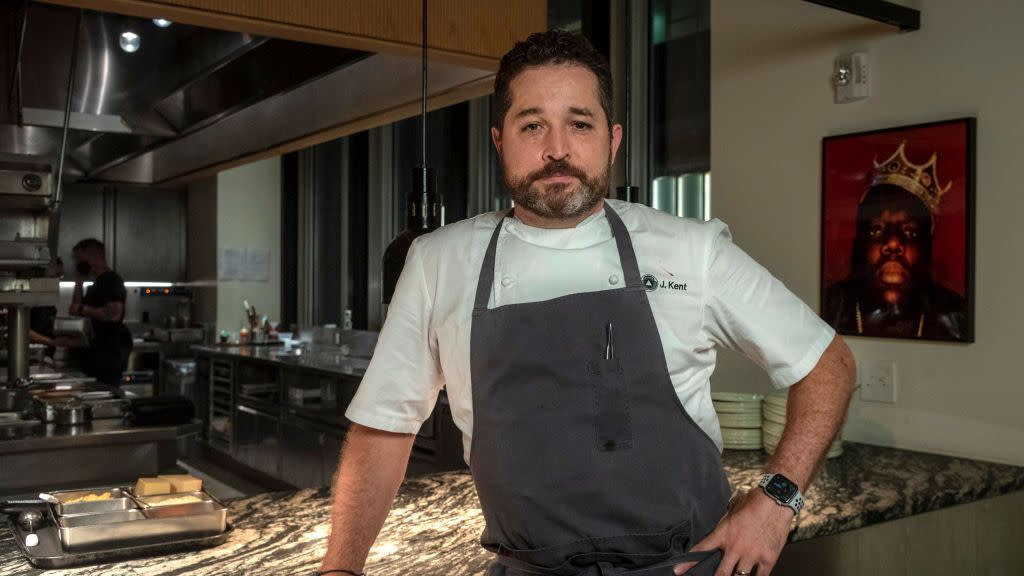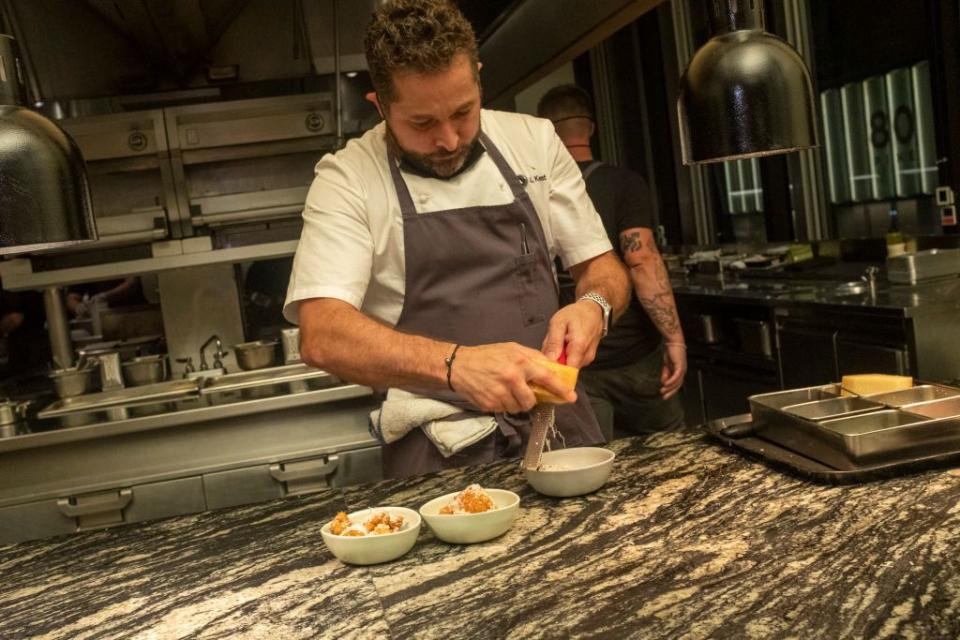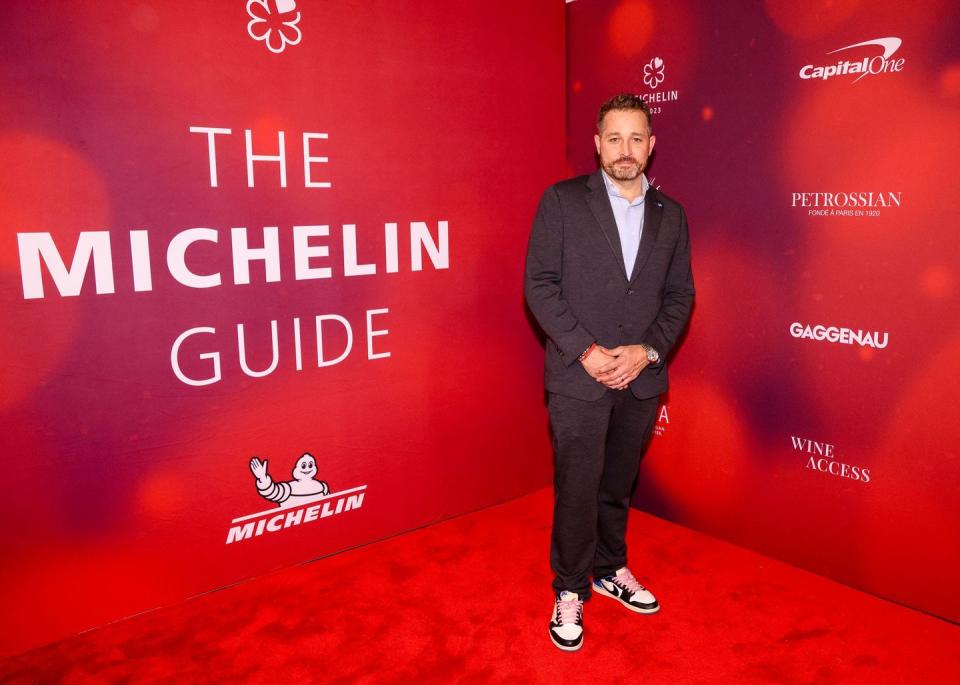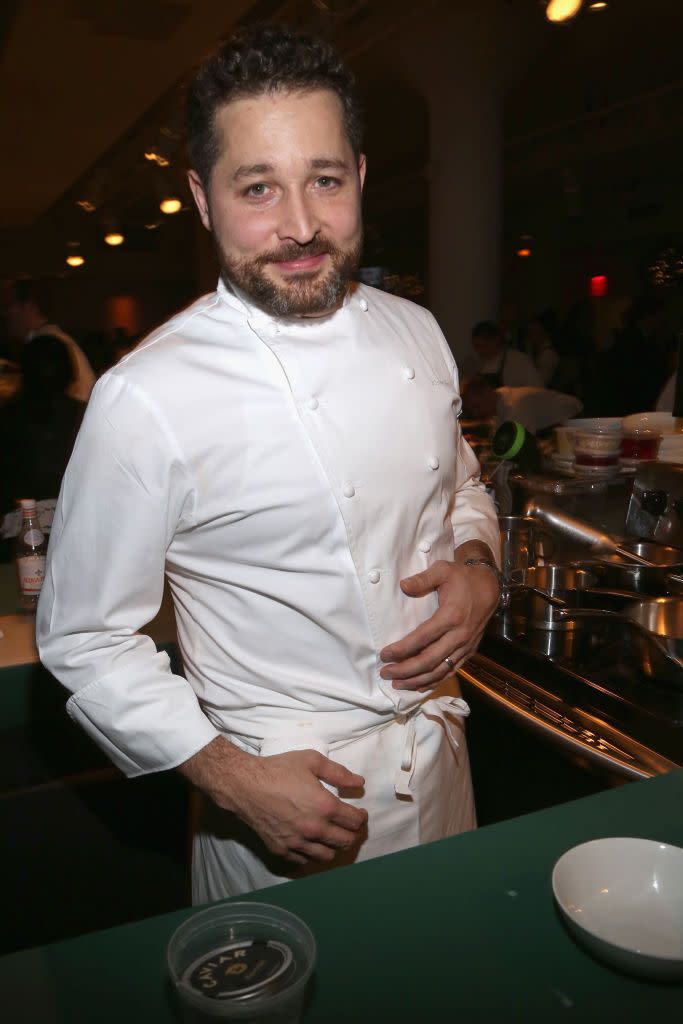The Food World Lost One of the Good Ones

Chef Jamal James Kent of Saga and Crown Shy in lower Manhattan, died suddenly, on Saturday, June 15th, 2024 at the age of 45. Below, Esquire contributor Joshua David Stein, who was working on a book with the esteemed chef, reflects on the kind of person Kent was, and his impact on the food industry.
Among the many things I’ll miss about Jamal James Kent is how he shook hands. He was a champion greeter: Fist bumps. Hand shakes. Dap ups. Hugs. The man loved salutations. The last time I saw him, the day before he died, just as I was leaving a meeting with him at Crown Shy, he said, “I gotta dap you up.” He stood up from the table around which we were sitting, came toward me, right arm raised, hand straight, perpendicular to floor and cocked at an angle that made clear what was expected. We locked hands and wrapped our left arms around each other—a gesture familiar to bros, divine when well-executed, cringe when bungled. As we embraced, I thought to myself, “This is a man I’m happy to know.” I gave him that most esteemed gesture of male friendship, I disengaged my right hand and gave him a pat on the side of his belly. He did the same. We didn’t say anything mushy, of course, but it was a gesture of love nonetheless.
Jamal is both his birthname and what he asked me to call him. We were writing a cookbook together, with recipes from Crown Shy, Saga, and Overstory, the three restaurants that occupy the bottom and top stories of 70 Pine, respectively, plus a few home recipes from the apartment in the building he shared with his wife Kelly and two kids, Gavin and Avery. When you write a book with someone, in their voice, or in a voice that is the amalgamation between theirs and yours—I call it a word baby—you get to know them from the inside out. When it’s a cookbook, you know them both through their words and through their work. Jamal’s recipes were precise, involved and thoughtful, as befits a chef whose first job in the kitchen was as a teenager with David Bouley. For instance, the preparation for the Crown Shy’s romaine salad, involves individually brushing each leaf with an herb dressing before stacking them up so that, as Jamal told me, when the salad is shared at the table, “Every bite is perfect on its own. That way no one is disappointed.” That’s as pure a distillation of the man’s approach to cooking as you’ll get.

When I first met Jamal, in 2010, he was the baby-faced sous chef at Eleven Madison Park, competing in Lyon for the Bocuse d’Or. Like everything he made during that year’s competition, his preparation—monkfish and lamb—was in some way homage to New York, the city in which he was born and which he deeply loved. The monkfish was served on a sleek curved platter (designed by BMW) meant to evoke Sag Harbor, where he spent summers with his mother, uncle and grandmother; the lamb on an angular one inspired by Frank Gehry’s 8 Spruce Street and the city grid. (That he came in tenth place had, I think, more to do with a European allergy to autobiographical cooking than with the food itself.)
E.B. White writes that there are three New Yorks, that of the native, the commuter and the transplant. “Commuters give the city its tidal restlessness; natives give it solidity and continuity; but the settlers give it passion.” Jamal was the rare New York native who brought the passion of a new arrival. What struck me when we began to work on the book together is how undimmed his enthusiasm still was after 45 years. His life was written in the blocks of Manhattan.

He was born in Greenwich Village, was a theater kid at Laguardia, and escaped a rather difficult home life by venturing out into the city at night, spray paint can in hand. His grandmother, Sue Mingus, was married to the legendary jazz giant Charlie Mingus and young Jamal spent time as a kid in the gin joints and jazz clubs where the Mingus Big Band gigged. Somewhere deep in his soul, the insistent bass line of “Better Git it in Your Soul” and that furious bari sax of “Moanin’" played on loop, informing, I’m sure, his enduring love of hip hop.
Walking around the city with him, his fast-paced narration was a New York songline. Every block held a story; every monument a memory; every “Now this is…” was chased by a “But I remember it was once…” Jamal saw the present as the palimpsest it is. I thought at the time, and still do though more poignantly now, that to grow up in New York City is to be acquainted with impermanence.
I’m writing this on Father’s Day and thinking naturally of Gavin and Avery, Jamal’s kids, and of Kelly, his wife, who he met at LaGuardia High School. (He studied voice; she studied dance.) There are so many layers of sadness in his passing. An aspect of the general confusion of mourning is that it’s hard to make sense of how to do it. All the switchboards of grief are lit up. I’ll pick just one. He was, certainly, a tremendously talented chef. He combined the soulfulness of Babbo, where he worked as a young man, with the maniacally precise execution of Daniel Humm’s Eleven Madison Park. And the restaurants at 70 Pine were just the beginning for him. Saga Hospitality Group had just taken over food and beverage on the legendary Santa Monica pier. With his pastry chef Renata Ameni in charge, he was opening a 3,000 square foot bakery opposite Domino Park in Williamsburg. He was planning a 140-seat oyster bar in Midtown and a fast casual chicken concept. He had just announced a new project, with Gregory Gourdet at the helm at Printemps, the Parisian department store’s New York expansion. Over family meal on Friday, he told me, “This is exactly how I want to grow,” he told me, “I don’t have to be the creative voice for all my projects.”

Though I rarely do this—for obvious reasons—I had agreed to be paid for the book project largely in food. His food was just that damn delicious. Jamal had a great team—Justin Osorio, Renata Ameni and Harrison Ginsburg to name just the few I worked most closely with—and I’m sure the restaurants will continue to operate at his exacting standards. You’ll still hear a loud “Oui, chef” when an order is fired at Crown Shy. But something I came to understand, through interviewing him for the headnotes, is how even the most complicated and baroque dishes at, say, Saga held a deep personal resonance for him. That connection is now severed.
It's funny. When I first heard the rumor of his passing, my first instinct was naturally to call Jamal up. “Dude, you’ll never believe the rumor going around about you.” Even now, the person I want to talk to most about this absurdity is Jamal himself. I imagine he would shake his head and, stealing a line from Mingus himself, might say “God’s got a funny soul, he plays like Charlie Parker,” and then he’d pull me in, dap me up and go in for the hug.
You Might Also Like


